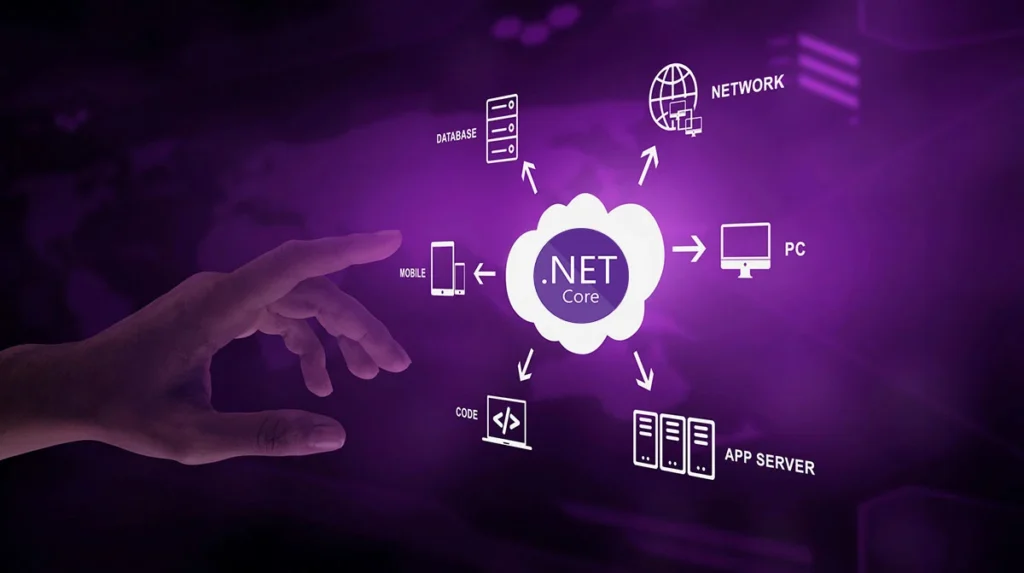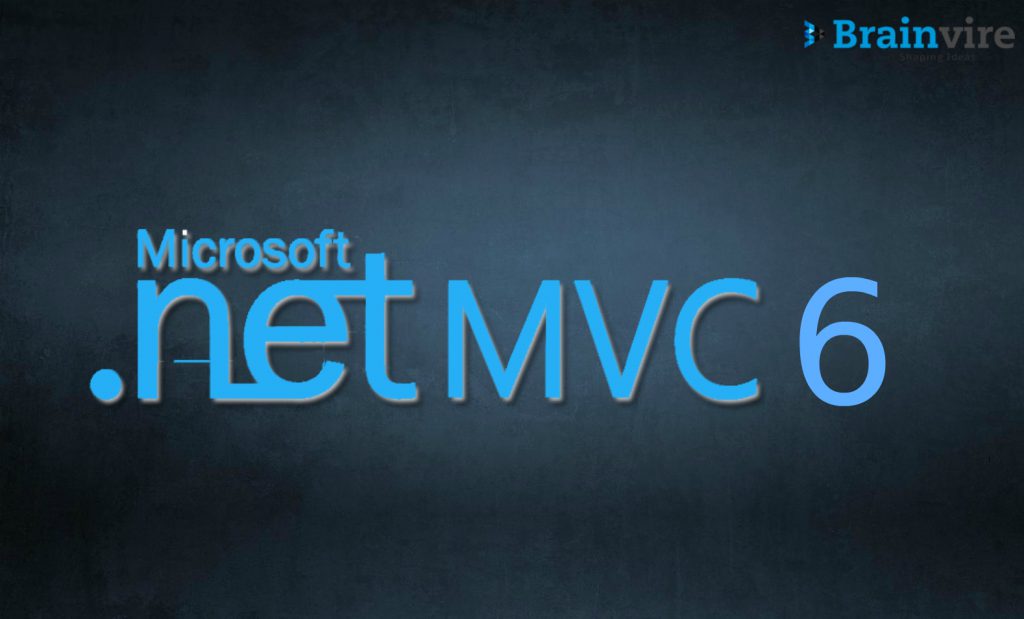In today’s fast-paced digital landscape, businesses and developers constantly search for the best technologies to build modern, scalable, high-performance applications. With the evolution of software development, selecting the proper framework is no longer just a technical decision—it directly impacts efficiency, cost, and future growth.
Enter .NET Core, Microsoft’s open-source, cross-platform framework designed to meet the demands of contemporary custom software development services. Whether you’re a startup building a cloud-native solution, an enterprise optimizing business applications, or a developer crafting microservices, .NET Core offers a robust ecosystem that delivers flexibility, security, and top-tier performance.
But why has .NET Core become the go-to choice for many developers and businesses worldwide? This blog will explore the key advantages of using .NET Core for software development, highlighting its capabilities, real-world benefits, and why it stands out in the competitive landscape.
1. Cross-Platform Compatibility

One of the most significant advantages of .NET Core is its cross-platform nature. Unlike its predecessor, .NET Framework, which was restricted to Windows, .NET Core supports Windows, macOS, and Linux. This allows developers to build applications running seamlessly across different operating systems without extensive modifications.
Key Benefits:
- Broader Reach: Develop once and deploy on multiple platforms.
- Cost-Effective: Reduce infrastructure costs by running applications on Linux-based servers.
- Flexibility: Use various development tools, including Visual Studio, VS Code, and JetBrains Rider.
2. High Performance and Scalability

Performance is crucial in modern applications, and .NET Core excels in this area. It is optimized for high-speed execution and efficient memory management. The introduction of the Kestrel web server, an asynchronous, cross-platform web server, has further improved performance.
Key Benefits:
- Faster Execution: .NET Core applications run faster than traditional .NET Framework applications due to its lightweight architecture.
- Scalability: Ideal for cloud-based applications and microservices that require dynamic scaling.
- Asynchronous Programming: Built-in support for asynchronous programming enhances efficiency in handling multiple tasks simultaneously.

3. Open Source and Community-Driven Development
Unlike the closed-source .NET Framework, .NET Core is open-source and actively maintained by Microsoft and a large developer community. This transparency fosters innovation, accelerates updates, and ensures robust security patches.
Key Benefits:
- Faster Updates: Continuous improvements and new feature releases.
- Community Support: Access to a vast pool of developers and resources.
- Transparency: Developers can contribute and customize the framework to meet specific needs.
4. Microservices Architecture Support
Microservices have revolutionized software development by allowing applications to be built as a collection of loosely coupled services. .NET Core is designed with microservices in mind, making it an excellent choice for businesses looking to modernize their applications.
Key Benefits:
- Independence: Develop, deploy, and scale services independently.
- Containerization: Seamless integration with Docker and Kubernetes for deploying microservices.
- Resilience: Fault isolation ensures that failures in one service do not impact the entire system.
5. Seamless Integration with Cloud Technologies
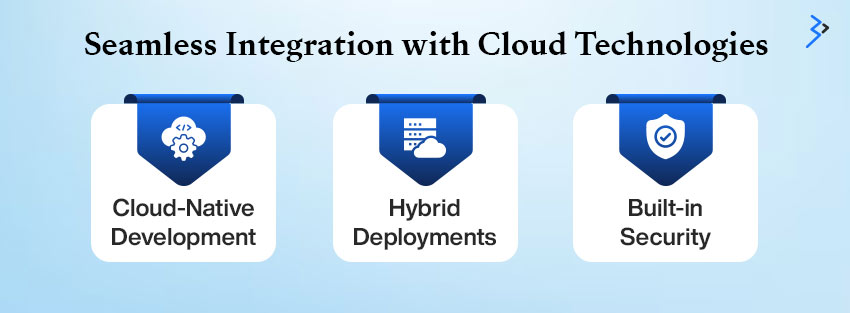
Cloud computing is essential for modern applications, and .NET Core is optimized for cloud-based development. Microsoft Azure, AWS, and Google Cloud support .NET Core applications, allowing developers to choose cloud providers.
Key Benefits:
- Cloud-Native Development: Supports serverless computing, containers, and distributed applications.
- Hybrid Deployments: Deploy applications on-premises or in the cloud.
- Built-in Security: Azure and AWS provide advanced security features for .NET Core applications.
6. Modern Development with ASP.NET Core
ASP.NET Core development services, the web application framework built on .NET Core, provides a robust environment for building web APIs, MVC applications, and real-time web applications using SignalR.
Key Benefits:
- Razor Pages and Blazor: Build interactive web UIs with ease.
- API-First Development: Ideal for mobile and single-page applications.
- Built-in Middleware: Improves performance by handling requests efficiently.
7. Enhanced Security Features
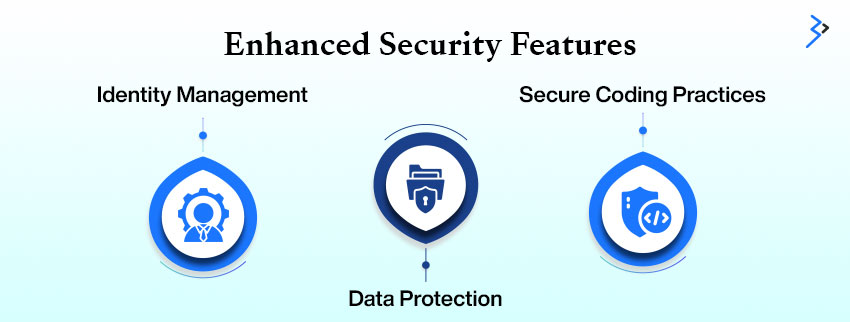
Security is a top priority for any application, and .NET Core provides robust security features such as built-in authentication, authorization, and data protection mechanisms.
Key Benefits:
- Identity Management: Supports OAuth, OpenID Connect, and Active Directory authentication.
- Data Protection: Secure data transmission using encryption and token-based authentication.
- Secure Coding Practices: Encourages developers to follow best security practices.
8. Support for DevOps and CI/CD
.NET Core integrates with modern DevOps practices and continuous integration/continuous deployment (CI/CD) pipelines, enabling rapid development and deployment.
Key Benefits:
- Automated Testing: Supports unit testing, integration testing, and automated UI testing.
- Containerization: Deploy applications using Docker containers.
- Infrastructure as Code (IaC): Automate infrastructure management with Terraform and Azure DevOps tools.
9. Cost-Effective Development
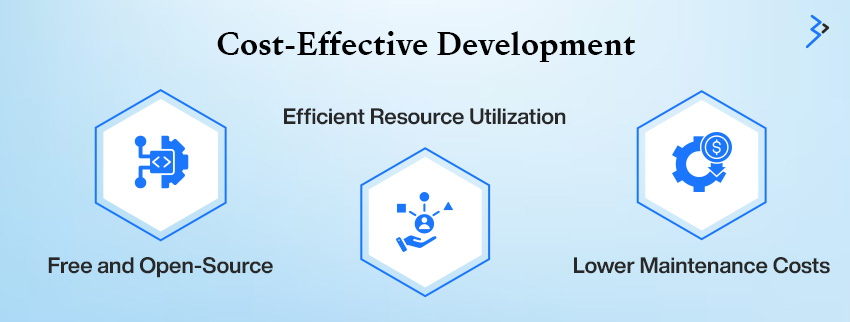
Leveraging open-source components, cloud compatibility, and performance optimization, .NET Core helps businesses reduce development and operational costs.
Key Benefits:
- Free and Open-Source: No licensing costs for using .NET Core.
- Efficient Resource Utilization: Optimized performance reduces hardware and cloud expenses.
- Lower Maintenance Costs: Simplified codebase and modular architecture reduce maintenance overhead.
10. Future-Proof Technology
Microsoft continues to invest in .NET Core, with .NET 6 and later versions providing unified development across all platforms. With its modern architecture, .NET Core ensures that applications remain future-proof and adaptable to technological advancements.
Key Benefits:
- Long-Term Support (LTS): Regular updates and long-term stability.
- Continuous Innovation: Integration with Artificial Intelligence and Machine Learning Development Services, and IoT technologies.
- Developer Productivity: Enhanced tooling and libraries streamline development.
Conclusion
The software industry is rapidly evolving, and choosing the right technology stack can determine a project’s success. .NET Core stands out as a modern, high-performance, and scalable framework that empowers developers to build robust applications with ease.
Whether you’re a business looking to optimize costs, a developer seeking cutting-edge tools, or an enterprise aiming for cloud-native solutions, .NET Core provides everything you need. Its open-source nature, cross-platform compatibility, seamless cloud integration, and strong community support make it a future-proof choice for software development.
If you’re considering migrating to .NET Core or starting a new project with this framework, there’s no better time to embrace its capabilities. Ready to elevate your software development? Contact our experts today and discover how .NET Core can transform your applications for the future!
Related Articles
-
ASP.Net Core: Your Answer to A NextGen Banking and Finance Web App Development
The days of waiting in long queues to open an account or deposit a check are long gone. Today’s modern customer demands quick finance management software solutions that enable them
-
Get a Glimpse of Trailblazing Effect of ASP.NET Core with React
Today, ASP.NET Core is a reliable and impeccable option to build the backend of a Single Page Application (SPA). This is why you have to search for ASP.NET Core Development
-
New Things to Explore in ASP.NET MVC 6
Talking About New Things to Explore in ASP.NET MVC 6, There’s something really nice for the developers to explore in ASP.NET MVC 6. MVC 6 is a design architecture or

